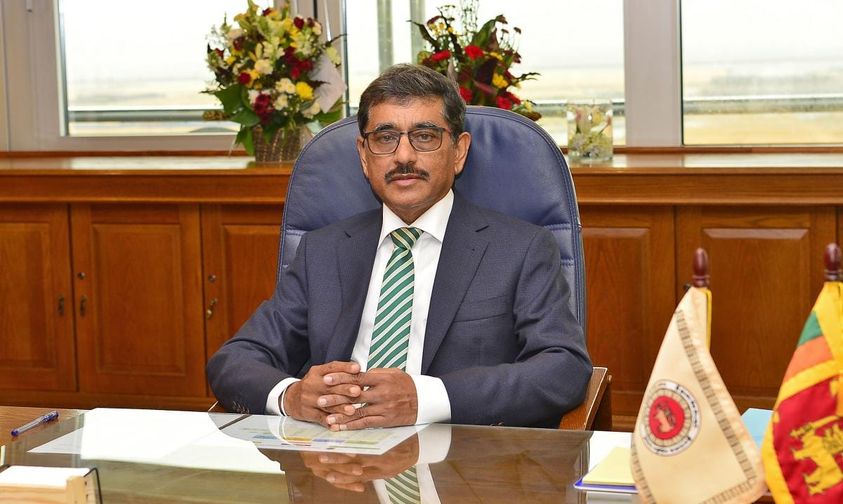By Shamindra Ferdinando
It was disclosed before the Committee on Public Enterprises (COPE) yesterday (25), the then Prime Minister Mahinda Rajapaksa, who served as the Finance Minister, had been briefed, in March-April 2020, on the impending financial crisis of unprecedented magnitude, but he had chosen to ignore the dire warning.
The parliamentary watchdog was told how the International Monetary Fund (IMF) had warned the then Governor of the Central Bank, Prof. W. D. Lakshman, and Treasury Secretary S. R. Attygalle, of Sri Lanka’s inability to procure loans unless the country undertook debt restructuring immediately.
COPE members received a briefing on the circumstances leading to the crisis when senior officials of the Central Bank appeared before the all-party body yesterday. CBSL Governor Dr. Nandalal has stated that the IMF warning hadn’t been heeded at all.
The COPE received confirmation of what has been widely speculated hours after UNP Leader Prime Minister Ranil Wickremesinghe, was sworn in as the new Finance Minister.
Janakantha Silva, Director Legislative Services / Director Communication, Parliament quoted Dr. Weerasinghe as having told COPE that following technical talks held in terms of the Finance Act pertaining to the IMF’s stand, recommendations were made to the then Premier and other senior officials. Dr. Weerasinghe has stated that the relevant decisions should have been made by the Premier, in his capacity as the Finance Minister and the entire Cabinet of Ministers.
The IMF has made its position clear after having asserted Sri Lanka lacked debt sustainability.
Asserting the failure on the part of those who managed the economy for causing a massive crisis, COPE Chairman Prof. Charitha Herath called it a crime. The first time entrant to Parliament recommended the setting up of a Special Parliamentary Select Committee to probe those who neglected their responsibilities thereby caused the current debilitating crisis. Prof. Herath blamed those few who managed the economy during that period.
SLPP National List MP Basil Rajapaksa succeeded Mahinda Rajapaksa in July 2021 as the Finance Minister whereas President Gotabaya Rajapaksa brought in SLPP National List MP Ajith Nivard Cabraal as the Governor of the Central Bank in Sept 2021. Cabraal quit in March to pave the way for Dr. Weerasinghe, the former Bank Deputy Governor to return from retirement in Australia, as its new Governor.
Dr. Harsha de Silva pointed out that the then Finance Minister Mahinda Rajapaksa delegated his responsibilities to the then State Finance Minister Cabraal who refrained from briefing the Parliament as regards the actual situation. Dr. de Silva said that the IMF’s declaration of debt sustainability should be examined against the backdrop of the revenue cut imposed on the recommendation of the then Secretary to the President and one time Central Banker and Treasury Secretary Dr. P.B. Jayasundera that deprived the Treasury of Rs 600 mn in taxes.
Dr. de Silva asked who decided on the tax cut in spite of the IMF specifically advising the government not to do so. The top SJB spokesperson and COPE member asked who decided on such reckless course of action.
COPE member and SLPP lawmaker Rear Admiral (retd) Sarath Weeraselera has said that tax cut was declared to encourage business and trade.
When COPE raised contentious issue of the Central Bank wasting precious funds to prevent depreciation of Sri Lanka Rupee, Dr. Weerasinghe has said this was the responsibility of the Monetary Board comprising five persons. The then Monetary Board member Dr. Ranee Jayamaha has revealed that the then Governor Prof. W.D. Lakshman, Treasury Secretary S.R. Attygalle and nominated member Samantha Kumarasinghe decided on that course of action in spite of her and Sanjiva Jayawardena, PC, opposing them. They had registered their protest in writing.
Dr. Weerasinghe assured the COPE that in spite of the difficulties likely to be experienced within the next three to four months he would try to achieve objectives.
Related posts
இணைய தொழில்நுட்ப உதவி




இணைந்திருங்கள்